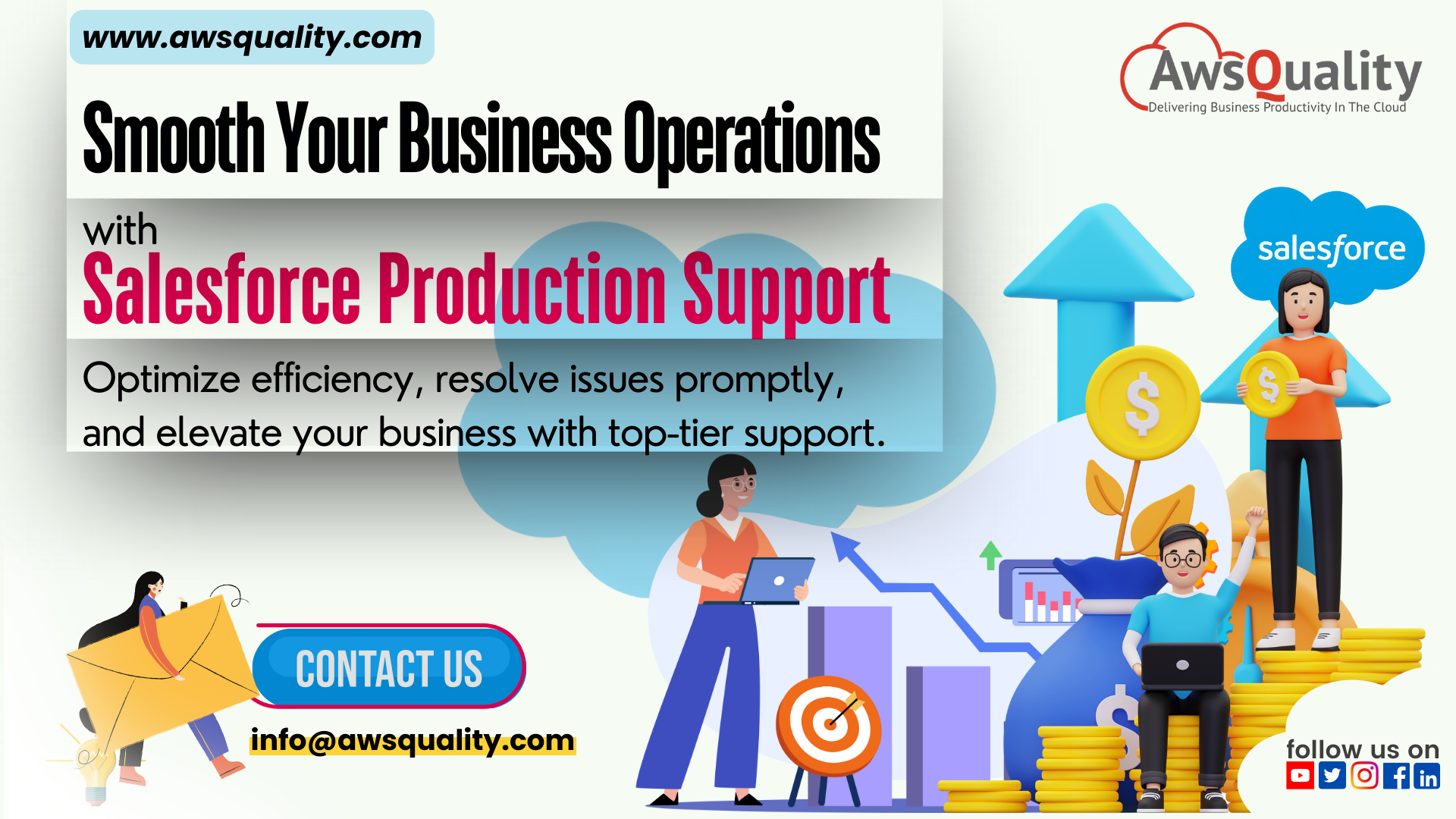
As the use of Salesforce expands throughout the world, it is crucial to guarantee smooth functioning and quick problem-solving. Salesforce Production support is essential for keeping the system operating efficiently and quickly resolving issues. Identifying company needs, creating unique solutions, controlling access, and carrying out root cause analysis are just a few of the responsibilities. Boost performance and dependability requires working with top Salesforce Consulting Partner like AwsQuality Technologies for Salesforce Custom Development, Salesforce App Development, and using a Salesforce Lightning developer for customized Salesforce solutions.
Transform Your Salesforce Experience: Expert Support for Smooth Operations
Salesforce production support:
Comprises ensuring smooth system operations and rapid issue resolution, crucial for maintaining efficiency. Understanding business requirements, developing customized solutions, controlling access, and identifying underlying reasons are among the responsibilities. Let’s discuss the same.
Duties related to salesforce production support
Now let’s explore the duties related to Salesforce production support. As more companies use Salesforce, it’s important to make sure everything runs well and to address any problems as soon as they arise. The following are the main duties for various Salesforce production support roles:
-
Salesforce Administrator:
- Recognize Business Requirements: Work with stakeholders to identify the objectives, challenges, and needs of the business.
- Compile the Needs: Gather requirements from the organization’s different teams.
- Declarative Solutions: To create solutions with the Salesforce platform, use declarative functionality (clicks, not code).
- Access Management: Reduce friction in daily chores by ensuring that all users have appropriate access to Salesforce.
- Upkeep of the Platform: Keep abreast on new releases and features, address bugs, and keep the platform maintained.
- User Education: Educate users about new features or functionalities
-
Salesforce Programmer:
- Work directly with Salesforce Administrators to verify business requirements and take limitations, scalability, and security into consideration.
- Custom Development: Create test classes, triggers, and Apex classes in accordance with specific needs.
- User Interface Development: Use Aura Components, Lightning Web Components, Visualforce pages, and Lightning pages to create unique user interfaces.
- Integration: To integrate Salesforce with other organizational systems, make advantage of Salesforce APIs.
- Best Practices: Create and maintain test classes for custom development, follow Salesforce best practices, and keep up with code documentation.
-
Engineer for DevOps at Salesforce:
- Track and Diagnose: Watch over production apps and systems, finding and fixing problems as they arise.
- Collaborate Across Functions: To resolve production-related difficulties, collaborate with teams that span functions.
- Root Cause Analysis: Determine the underlying causes of problems and suggest fixes to stop them from happening again.
- Documentation: Write up and keep up with records pertaining to production problems and their fixes.
Collaboration between administrators, developers, and DevOps engineers is crucial for efficient Salesforce production support, as these jobs frequently overlap. Continue exploring the extensive ecosystem and keep up with the most recent features and trends if you’re interested in a career in Salesforce!
What are a few typical production problems with Salesforce?
Production environments for Salesforce may face a number of problems. Let’s examine a few of the more prevalent ones and how to deal with them:
-
Duplicate Records:
- Over time, duplicate records may amass, producing erroneous data and aggravating users.
- Solution: Either manually evaluate and combine duplicates or use Salesforce’s deduplication capability to integrate them automatically. Put data accuracy first in order to keep your database tidy.
-
Loss of Data:
- System malfunctions, user mistake, and power outages can all result in data loss.
- Preventive actions:
- Make regular backups of your data using the built-in backup function in Salesforce.
- For extra security, think about utilizing backup services from third parties.
-
Concerns about security:
- Because Salesforce is cloud-based, there are security vulnerabilities by nature.
- Strategies for Mitigation:
- Make use of the data encryption and two-factor authentication that Salesforce has built in.
- Investigate outside security options to improve data security.
-
Sluggish performance:
- Large data sets or intricate procedures may be the cause of slow performance.
- Optimization Advice:
- Index fields and use effective queries to maximize data retrieval.
- Simplify difficult procedures and stay away from pointless modifications.
Remember that continuous training, routine maintenance, and proactive monitoring are necessary for a productive Salesforce production environment. To guarantee the best possible system performance, take quick action if you run into any of these problems.
You can also investigate Salesforce’s Known Issues page, which offers transparency regarding flaws and remedies, for more in-depth details. Think about the issues encountered in using Salesforce as well, like poor support, trouble with customisation, weakened data integrity, and low user adoption. These tips can assist you in successfully avoiding typical errors.
How can I fix Salesforce’s sluggish performance?
Although slow performance in Salesforce might be annoying, there are a few things you can do to identify and fix the problem. Now let’s look at some troubleshooting advice:
-
Problems Unique to Users:
If certain users experience slow Salesforce performance, take into account the following:
- Troubleshooting with Browsers:
Go over the procedures for troubleshooting Google Chrome, Safari, Mozilla Firefox, and Microsoft Edge in particular. - Network Connection:
Check the speed of your network connection to see if any slowness is caused by a problem with the network. - Mobile Devices:
Diagnose Salesforce’s sluggish load times on iOS and Android smartphones. - Lightning Experience User Interface:
Resolve browser, device, and geography issues to enhance Lightning Experience performance.
-
Overall Advice:
Here are some more actions you may take to improve Salesforce load time:
- Close any tabs in your browser that aren’t needed.
- Frequently, remove your cookies and cache.
- Cut down on the quantity of Chrome add-ons.
- Turn off “preview report results” when running reports to speed up loading.
- Steer clear of the “CONTAINS” filter.
- When screen-sharing over a phone call, only the pertinent Salesforce page should be open.
Recall that greater performance is a result of proactive maintenance, being up to current on Salesforce updates, and optimizing your setup. If problems continue, think about contacting Salesforce support with specific information for one-on-one help!
In Conclusion
Seamless Salesforce production support is a game-changer in the changing business environment of today. With AwsQuality Technologies, the top Salesforce Consulting Partner, you can improve your Salesforce experience. We guarantee optimal performance and user happiness with our knowledge of Salesforce Custom Development, creative Salesforce App Development, and elite Salesforce Lightning Developers. Welcome to effective, personalized Salesforce solutions and bid adieu to frequent problems.
Are you prepared to revamp your company?
Start your path to success by visiting www.awsquality.com!




